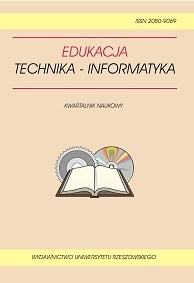Methodology and Teaching Methods of the Study Course: Theory of Cooperation in Education
DOI:
https://doi.org/10.15584/eti.2017.3.4Keywords:
methodology, teaching methods, methods of professions, learning theory, theory of cooperation in educationAbstract
Scientific methods that are part of knowledge – it is whole arsenal of accumulated research methods and stage of scientific activity (techniques, methods) used in the process of scientific activity in this particular cycle. In particular, problems and hypotheses is scientific knowledge also, but they are more significant than stages of scientific activity. Scientific activity – intellectual creative activity aimed at obtaining and use of new knowledge. It comprises the steps of obtaining scientific production: 1) formulation (appearance) of the problem; 2) construction of hypotheses and using those that already exist; 3) creation and implementation of new methods of research aimed at proving the hypotheses; 4) summary the results of scientific activity. It is necessary to mean that the main product that meets the objectives and problems which are resolved, science gets only at the end of the cycle in the form of laws and theories. In the intermediate stages the science gets a by-product a part of which is used in the same cycle, and part goes to replenish the knowledge and the formation of new cycles. Scientific activity exists in various forms, such as: scientific and research activity; scientific and organizational activity; scientific and educational activity; scientific and information activity; scientific and support activity, etc. (Розвиток науки…).Downloads
Published
2017-09-30
How to Cite
ZHURAVSKA, N., & MARIIA, L. (2017). Methodology and Teaching Methods of the Study Course: Theory of Cooperation in Education. Journal of Education, Technology and Computer Science, 21(3), 38–42. https://doi.org/10.15584/eti.2017.3.4
Issue
Section
THE PROBLEMS OF GENERAL AND ENVIRONMENTAL EDUCATION
License
Copyright (c) 2017 Journal of Education, Technology and Computer Science

This work is licensed under a Creative Commons Attribution-ShareAlike 4.0 International License.

